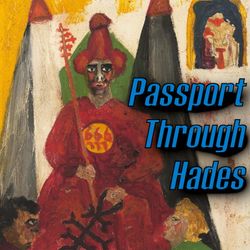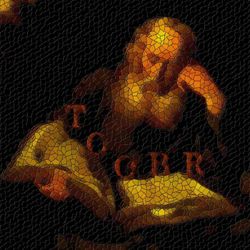Latest episode

NEW PODCAST: Passport Through Hades
00:59|New podcast. Available from the usual places. Alan Chapman and Duncan Barford, editors of a forthcoming collection of Aleister Crowley's magical writings, discuss the true meaning of Crowley's legacy and thought.
More episodes
View all episodes

9. A longing for transcendence with a certain style
34:25||Ep. 9A collection of fictional writings that break the traditional rules of storytelling leads us into a consideration of how writing might be used for magical purposes.The book, this episode, is: John Foxx, The Quiet Man: Short Stories by John Foxx (London: Rocket 88 Books, 2020).See also: Mark Fisher, Ghosts of My Life: Writings on Depression, Hauntology and Lost Futures (Winchester, UK: Zero Books, 2014).Listen to John Foxx reading his story “The Marvellous Notebook” (among others) at: https://tinyurl.com/yr46a2y6 (bandcamp.com, accessed January 2025).To support the podcast, buy me a coffee at https://ko-fi.com/oeith or https://www.buymeacoffee.com/dbarfordG. Or you could send me a lovely book from https://www.amazon.co.uk/hz/wishlist/ls/1IQ3BVWY3L5L5?ref_=wl_share.
8. Suddenly psychosis isn't so psychotic
39:57||Ep. 8We consider in detail some intriguing and sometimes startling true cases, exploring a text that offers frank and practical guidance to psychotherapists on how they should respond when paranormal forms of communication occur within therapy.The book, this episode, is: The Psychic Thread: Paranormal and Transpersonal Aspects of Psychotherapy, by Elizabeth E. Mintz, in consultation with Gertrude Raffel Schmeidler (New York: Human Sciences Press, 1983).To support the podcast, buy me a coffee at https://ko-fi.com/oeith or https://www.buymeacoffee.com/dbarfordG. Or you could send me a lovely book from https://www.amazon.co.uk/hz/wishlist/ls/1IQ3BVWY3L5L5?ref_=wl_share.
7. Glimmers from the matrix of ideas
35:51||Ep. 7The seeds of chaos magic, uncovered in the unlikely context of a 1975 children’s book on chance and probability. We take a nostalgic romp through some of the fascinations and shortcomings of a scientistic take on magic, which seems to have formed a significant current in the 70s zeitgeist.Our text for this episode is Chance, Luck & Destiny, by Peter Dickinson (London: Victor Gollancz, 1975).For more about the book and Dickinson’s account of its origin, see https://tinyurl.com/yhks8vxe (peterdickinson.com). Accessed October, 2024. On the same website are details of all Dickinson’s books, including The Changes trilogy (The Devil’s Children, Heartsease, and The Weathermonger).Support the podcast by joining my Patreon at: https://patreon.com/oeith. Buy me a coffee at https://ko-fi.com/oeith or https://www.buymeacoffee.com/dbarfordG. Or you could send me a lovely book from https://www.amazon.co.uk/hz/wishlist/ls/1IQ3BVWY3L5L5?ref_=wl_share.
6. Ghosts haunt places but poltergeists people
44:22||Ep. 6An obscure and possibly much underrated poltergeist case, from 1938, is our springboard into issues concerning how a psychoanalytical approach to paranormal investigation radically recontextualises the notion of “faked” versus “genuine” psychical phenomena.The text under discussion is On the Trail of the Poltergeist, by Nandor Fodor (New York, NY: Citadel, 1958).For more about Fodor’s life and work, see the short biography provided at: survivalafterdeath.info, https://tinyurl.com/mpfrs32k. Accessed September, 2024. For more on the Thornton Heath poltergeist case, see: Kate Summerscale (2020), The housewife, the ghost hunter and the poltergeist, https://tinyurl.com/2pceja3c (theguardian.com). Accessed September, 2024.Support the podcast by joining my Patreon at: https://patreon.com/oeith. Buy me a coffee at https://ko-fi.com/oeith or https://www.buymeacoffee.com/dbarfordG. Or you could send me a lovely book from https://www.amazon.co.uk/hz/wishlist/ls/1IQ3BVWY3L5L5?ref_=wl_share.
5. Disembodied voices trying to hypnotize
32:58||Ep. 5Can discarnate entities take possession of human beings? We consider an academic text that attempts to build a serious case by drawing on the work of Frederic Myers and considering evidence offered by the nature of dissociative states and hypnosis.The text under discussion is The Science of Spirit Possession, second edition, by Terence Palmer (Newcastle, UK: Cambridge Scholars). Available at: https://tinyurl.com/4ecs3xen (amazon.com).To find out more about Palmer’s work, see the discussion between him and Jeffrey Mishlove, https://tinyurl.com/bddh7t9m (youtube.com), and Palmer’s website (“Healing the Wounded Spirit”), https://tinyurl.com/4dm8b5kp (terencepalmer.co.uk). Accessed August, 2024.Support the podcast by joining my Patreon at: https://patreon.com/oeith. Buy me a coffee at https://ko-fi.com/oeith or https://www.buymeacoffee.com/dbarfordG. Or you could send me a lovely book from https://www.amazon.co.uk/hz/wishlist/ls/1IQ3BVWY3L5L5?ref_=wl_share.
4. A microcosm in no sense separated from reality
33:24||Ep. 4In a change from the promised episode, a search for an intriguing-sounding text prompted by a half-remembered reference in a letter by Aleister Crowley leads us into an exploration of how language facilitates expression of what lies beyond sensory perception.The main text under discussion is: Anatole France (1908). Aristos and Polyphilos on the Language of Metaphysics. In: The Garden of Epicurus, translated by Alfred Allinson (London: John Lane). Available at: https://tinyurl.com/2xrvjfuv (archive.org). Accessed July, 2024.The other texts mentioned are:Aleister Crowley (1982). Chapter XXVI: Mental Processes — Two Only are Possible. In: Magick Without Tears, edited by Karl J. Germer (New York: Ordo Templi Orientis). Available at: https://tinyurl.com/2ht6n4dp (hermetic.com). Accessed July, 2024.Jacques Derrida (1974). White Mythology: Metaphor in the Text of Philosophy, translated by F.C.T. Moore, New Literary History, 6 (1), pp. 5-74. Available from: https://tinyurl.com/yk5byceh (tfreeman.net). Accessed July, 2024.Support the podcast by joining my Patreon at: https://patreon.com/oeith. Buy me a coffee at https://ko-fi.com/oeith or https://www.buymeacoffee.com/dbarfordG. Or you could send me a lovely book from https://www.amazon.co.uk/hz/wishlist/ls/1IQ3BVWY3L5L5?ref_=wl_share.